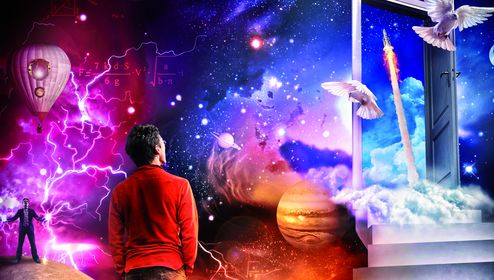
Although mini-series "Great dreamers" on "Ukraine" had no episodes about national well-known personalities it fits into the context of current events. You can judge everyone who goes or will go to Maidan as you like, but each of them has a dream. Some citizens criticize those dreams. And every dreamer has plenty of stubbornness and perseverance to achieve the goal.
Nevertheless the premiere was held. One of the incentives to watch all five films was that one about Jules Verne got an award at Cannes Corporate Media & TV Awards. Press-service of the producer FILM.UA reported this last fall - a few months before the official Ukrainian premiere.
By the way, the story of Jules Verne was the only story about a writer in this series. Other – Archimedes, Leonardo da Vinci, Nikola Tesla and Konstantin Tsiolkovsky - were scientists and inventors. Although Leonardo is also known as an artist, in all the films about him the main idea is that art to him was a subsidiary because he couldn’t fully realize all his engineering projects. In those times it was seen as a challenge to God hence the sale of the soul to the devil.
However, in the mouth of Leonardo da Vinci the authors of the project put words that by and large are its leitmotif. If there will be more episodes, following stories somehow will survive compliance with the thesis: a man with a dream forgets about real life for a long time. Dissociates himself from it and sets himself against the society and even beloved ones.
TV previews position "Great dreamers" as blockbusters, which is true to a certain extent. Computer graphics takes up to 50% of visual imagery. And it was noticed that computer special effects, made in Ukraine, in particular by FILM.UA, keep a high standard and are constantly improving. However, "blockbuster" is quiet a pathetic word. And even under current conditions means a scale of a story, something like "The Hobbit" or "300". The format of "Great dreamers", with all the technological excellence and variety of interesting visual solutions, yet is a private, chamber story, even though each character is a man of scale.
The main here is to show history as a way of storytelling, not a science. Instead of narrators Jules Verne and Nikola Tesla speak for themselves. First - lying in the bed after the attack of an unbalanced nephew, the second - in an interview in his hotel room. Other characters shown through their beloved ones, and here evaluative judgments can’t be avoided.
Difficult to resist asking: why Ukrainians are not represented among the major dreamers? I agree that favorite writer or artist of genius will attract more attention. Ukrainian dreamers and stories of their success are poorly represented in the media. And if someone becomes a main character of the film, it turns out pathetic, sad, old-fashioned and conservative. A budget choice, I’d say.
In short, every time an attempt to show a story of success in the "budget" implementation often convinces the viewer that the stories of famous Ukrainians are stories about losers, who had a dream, but for various reasons, were unable or unwilling to achieve it. However, a few years ago "Ukraine" has shown a film of its own production "Made in Ukraine" where a number of not too well-known to the general public Ukrainian surnames were mentioned. But, by and large, a separate story can be created about each of them. The disadvantage of such project is lack of information and, to be honest, poor media coverage. Of course, the best option is to shoot about Jules Verne, a safe bet.
However, it’s not that hopeless. There is Sergei Korolyov, the father of spaceflights. There is Nikolai Miklukho-Maklai, a tireless traveler. There is Nikolai Gogol, whose "Inspector" and "Wii" help to create stories for almost two hundred years. That’s only the top of the iceberg. Dig deeper...but that's another story.
Andrei Kokotukha.
FILM.UA Group
22, Mykoly Zakrevskoho str., Kyiv, 02232, Ukraine
tеl.: 0 800 308 028, +380 44 501-39-71 fax: +380 44 546-68-97 e-mail: info@film.ua
Developed by Argentum IT Lab
